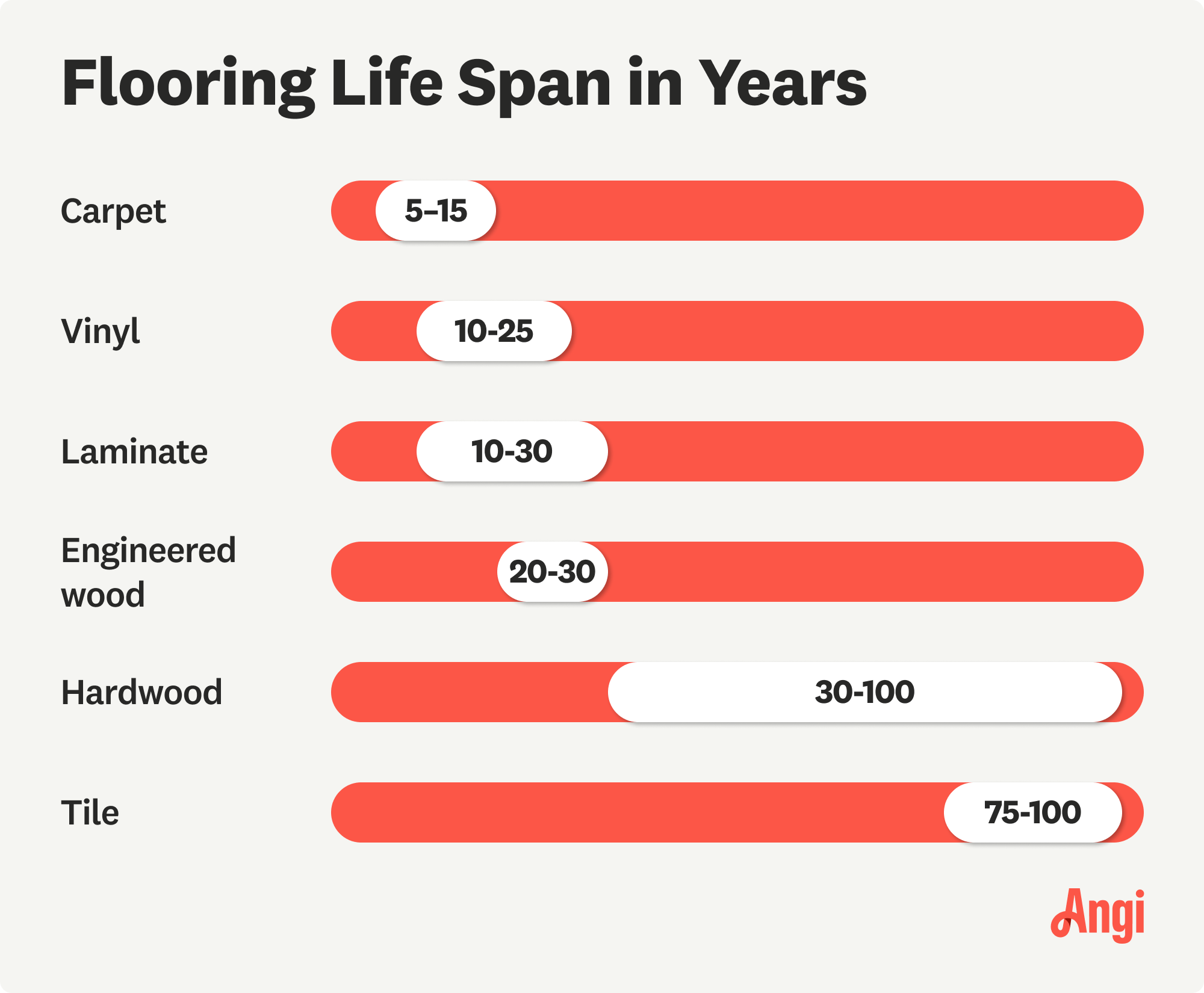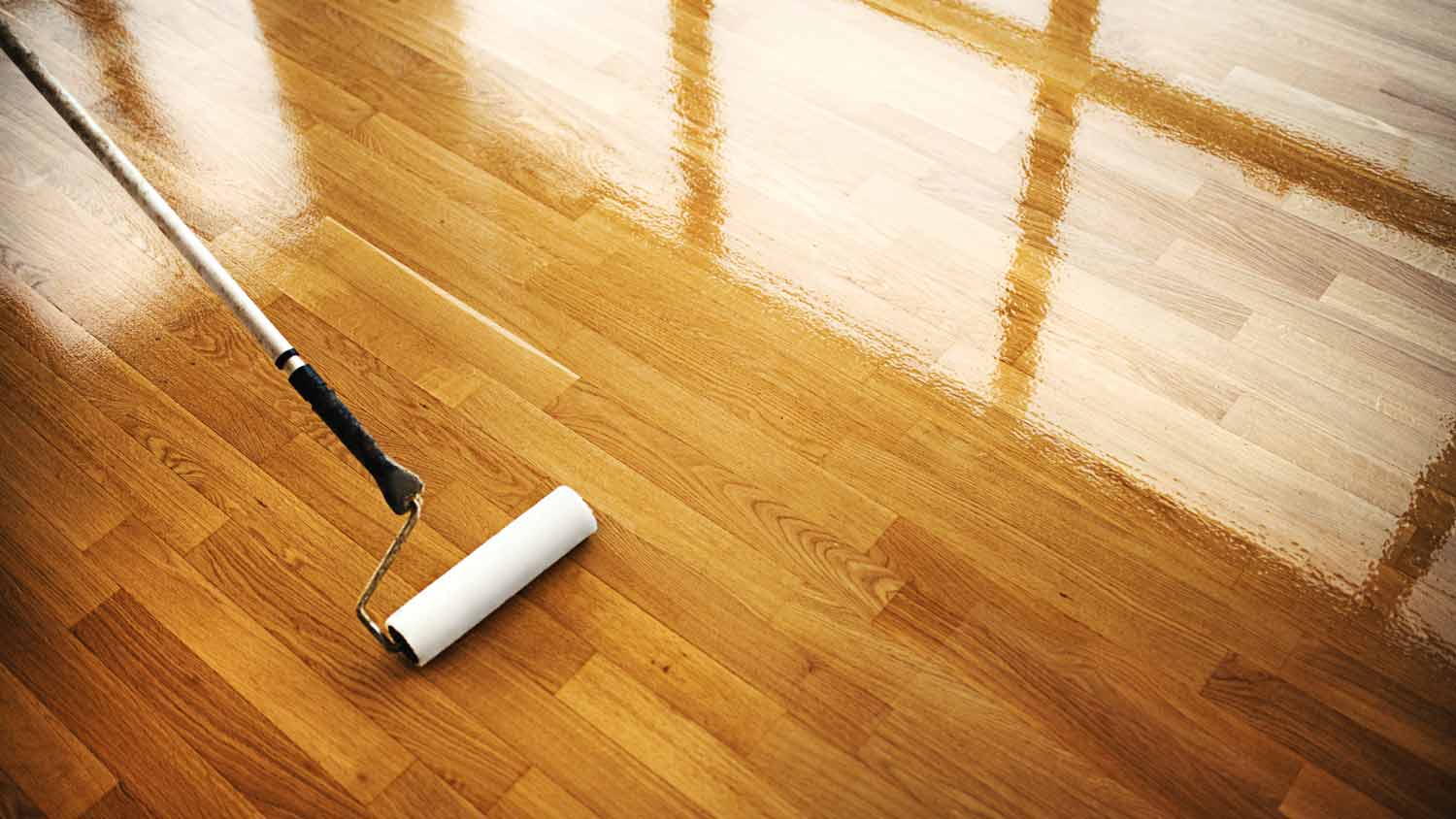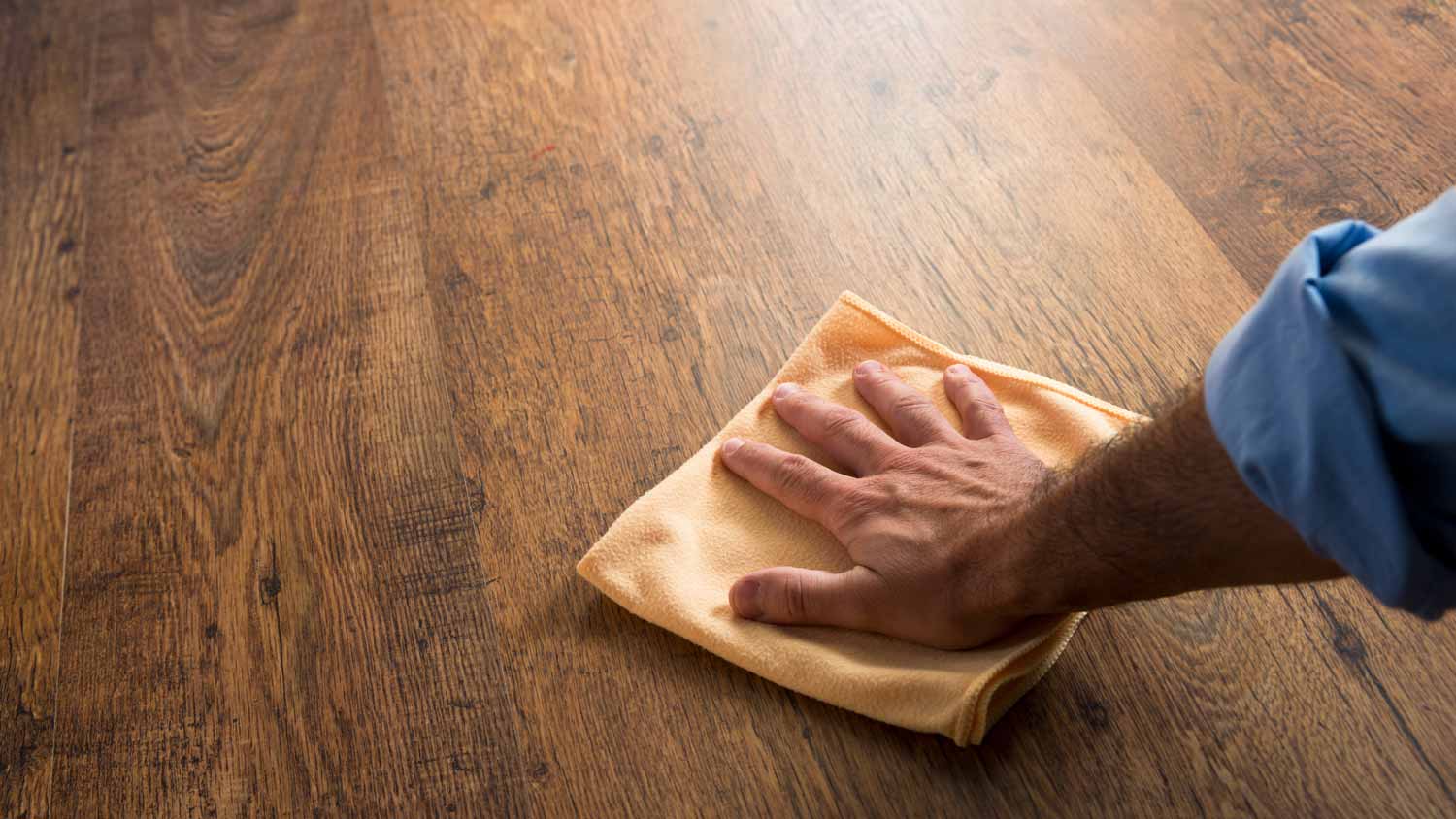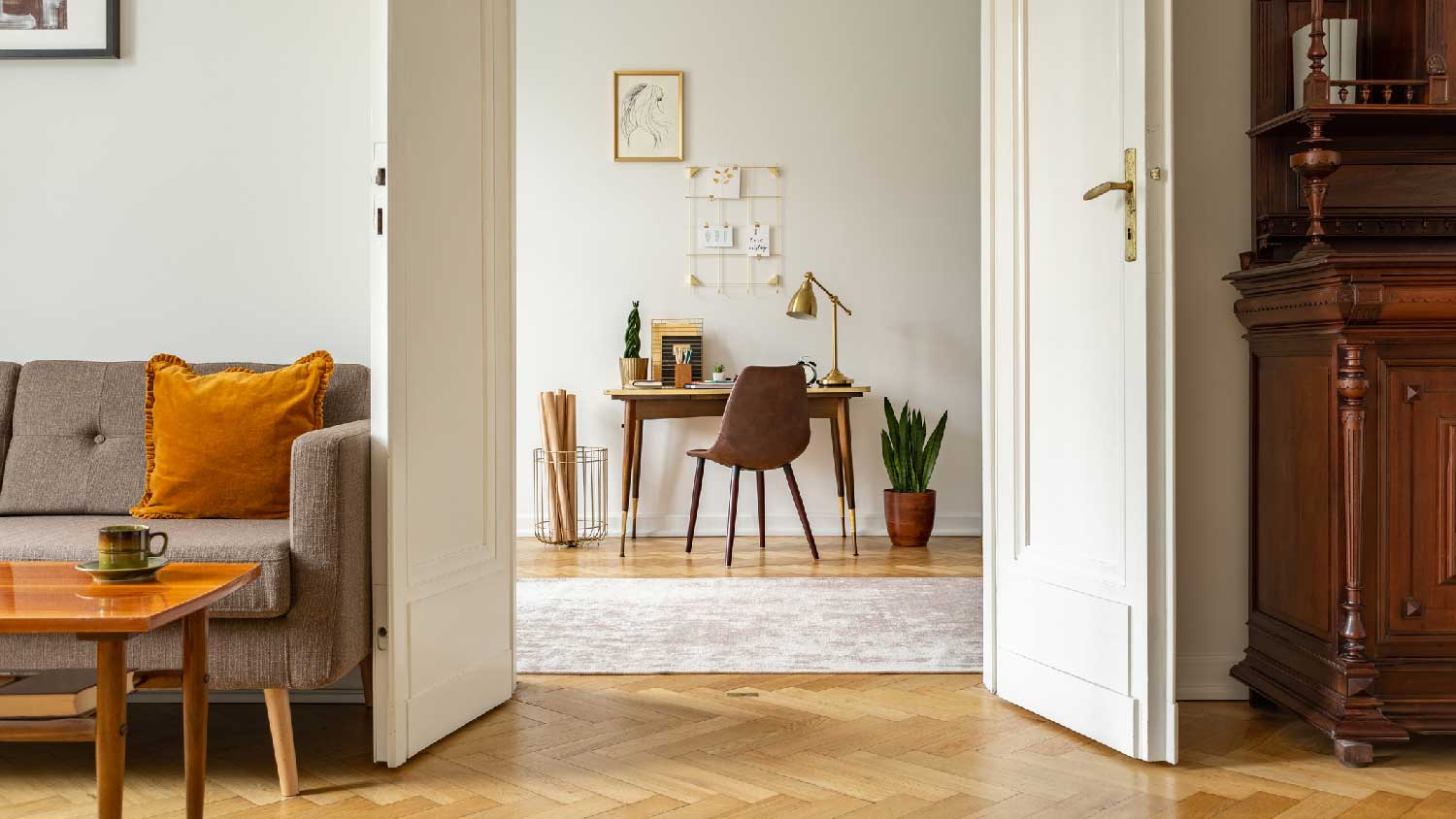
Both materials and labor determine hardwood floor installation costs. This guide breaks down all the prices you need to know before starting your new flooring project.
Proper maintenance lets your floors last a lifetime


Hardwood floors add a timeless quality to any home and can increase your home value when you sell. But how long do they last, and how can you maximize your floors’ life span? Learn how long your hardwood floors will last and how to maintain them to keep them in like-new condition for decades.

Solid hardwood flooring lasts 30 to 100 years (or more), while engineered hardwood flooring can last at least 20 to 30 years. Your floor’s life span depends on the type of wood, the quality of the product, how it was installed, where it is located, and whether it receives regular maintenance.
Hardwood is a durable flooring choice and often lasts longer than other flooring materials. For example, carpet flooring lasts around five to 15 years, and laminate flooring lasts between 10 and 30 years.
These factors can help you understand how to care for your hardwood floor and when to budget for a flooring replacement project.
The species of your hardwood floors determine its expected life span. Hardwoods like cherry and oak can last up to 30 years, as can engineered hardwood. Pine has the longest life span as it hardens over time, and it’s not unusual to find original pine floors in homes 100 years old.
| Type of Wood | Average Life Span |
|---|---|
| Bamboo | 10–30 years |
| Cherry | 30 years |
| Engineered hardwood | 20–30 years |
| Oak | 25–30 years |
| Pine | Up to 100 years |

Applying a protective coating or finish to hardwood floors is advisable to help them last longer. The type of finish on your floor can affect its longevity.
Wax finishes enhance the wood’s natural color but aren’t as durable as other finishes.
Water-based polyurethane sealer has a long-lasting finish that is best for high-traffic areas—but this type of finish is also one of the priciest.
Oil-based polyurethane sealer is also durable but has a strong smell that some homeowners may find unpleasant.
High humidity can cause wood to expand and swell, which can cause buckling. Low humidity levels have the opposite effect, shrinking the wood boards and causing gaps between planks. Extreme temperature fluctuations can also be hard on wood, making it more brittle and likely to crack. Keeping a stable temperature in your home can help mitigate these issues.
The more you use something, the shorter its life span. This is true of hardwood floors; areas with heavy foot traffic are more likely to wear away first and are more prone to scratches, scuffs, dents, and other damage. Strategically placed rugs can help protect high-traffic areas.
Regular maintenance can help your hardwood floors last longer. Sweep or vacuum your hardwood floors daily or weekly, depending on your household size and the presence of pets. It’s also wise to recoat the floors with finish every three to five years to keep them looking good. Refinishing your wood floors once a decade can also increase their longevity and make them look new again.
Even the most durable hardwood floor will need replacing at some point. There are several signs to look for that suggest replacement is required, including the following:
Deep scratches and gouges that affect the structure of the floor
Extensive water damage
Flooding damage
Cupping or crowning from moisture damage
Excessively wide gaps between planks
Ultimately, you’ll need to consider the extent of the damage and your budget when deciding whether to replace your floors. A hardwood floor installer near you can provide a quote that fits your budget and needs.

Proper maintenance can help your hardwood floors last longer. Learning how to care for hardwood floors properly can prevent damage and keep your floors looking good for years to come:
Remove debris often
Mop up spills immediately
Install furniture pads
Add rugs in high-traffic areas
Repair minor damage
Refinish as needed
Hardwood floors typically come with warranties when installed. The exact details and length of the warranty will depend on the flooring manufacturer, the installation company, and the type of wood used.
Hardwood floor warranties often have small print requiring the homeowner to maintain the floor properly; failure to do so risks voiding the warranty. These warranties tend to exclude natural expansion, moisture-related damage, fading caused by sunlight exposure, and damage caused by DIY repairs.
Some types of damage can be repaired easily—either by the homeowner as a DIY project or by an experienced professional. Other types of damage are beyond repair and will require replacement instead.
Scratches or gouges can be repaired relatively easily using wood putty or filler, provided they are shallow and superficial. However, replacement is likely required if the scratches are deep enough to affect the floor’s structural integrity.
Color fading can usually be fixed by refinishing the floor rather than replacing it entirely.
Water damage from a minor spill or leak can be reversed using a fan or dehumidifier to remove the moisture from the wood. However, flooring with extensive water damage or damage caused by major flooding requires replacing.
Gapping between planks can be fixed by removing and reinstalling the affected planks or by filling in the gaps using wood putty. Depending on the width of the gap and the extent of the problem, it might be better to leave this to a pro.
Pet urine stains can be addressed using DIY methods. Mop the puddle up as soon as you see it and clean the stain thoroughly to remove any smell. You may prefer to hire a local floor cleaning professional to ensure no odors remain.
Refinishing your hardwood floors can make them look new again without the price tag of brand-new floors. The cost to refinish hardwood floors falls between $1,100 and $2,670, with an average cost of $1,890. How often you should refinish hardwood floors depends on the wood type and how much foot traffic it sees. If the flooring is exposed to heavy foot traffic daily, expect to refinish floors at least every 10 years or more often.
From average costs to expert advice, get all the answers you need to get your job done.

Both materials and labor determine hardwood floor installation costs. This guide breaks down all the prices you need to know before starting your new flooring project.

It’s impossible to keep floors damage-free over the years. Thankfully, the cost to refinish hardwood floors is far less than the price tag to replace them altogether.

Here’s what you should expect to pay when renting an orbital, drum, vibrating, or edging floor sander—as well as where you can rent them and what else to know.

Learn how to repair hardwood floors—no matter the type of damage. This guide will help you buff out scratches, fill cracks, and get rid of pesky water stains.

Unsure who to hire for hardwood floor refinishing? A professional floor refinisher is the answer. They provide guaranteed results and save you time and energy.

Discover engineered hardwood flooring pros and cons, from style and stability to cost and care. Here’s what you need to know to make the right choice.